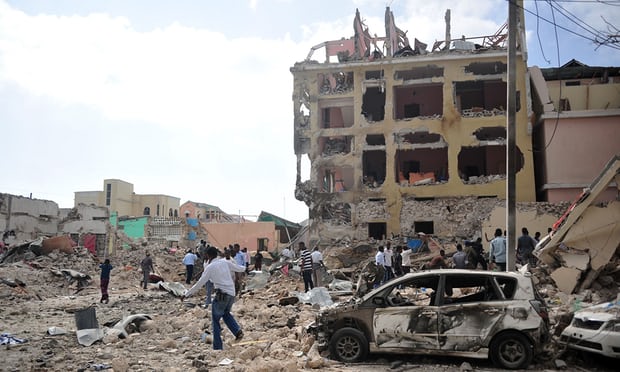African governments' actions push people into extremism, study finds
- U.S, Britain curb electronics on flights from Middle East-North Africa
- Celebrities call on South Africa to withdraw plan on rhino horn trade legalization
- Fall armyworm 'threatens African farmers' livelihoods'
- Fighting in Central African Republic kills 16 people
The finding, in a United Nations study published on Thursday which is one of the largest of its kind, is likely to prompt controversy.
Authorities are battling jihadi groups such as Boko Haram in west Africa and al-Shabaab in east Africa, as well as Islamic State and al-Qaida offshoots in the Sahel, often with the support of the US and other western powers.
 |
| The scene of an al-Shabaab attack in Mogadishu. Violent extremism in Africa has killed more than 33,000 people in six years. Photograph: Mohamed Abdiwahab/AFP/Getty Images |
Violent extremism in Africa has killed more than 33,000 people over the last six years and caused widespread displacement, creating or aggravating humanitarian crises affecting millions of people and hitting economic prospects across the continent.
“In a majority of cases, paradoxically, state action appears to be the primary factor finally pushing individuals into violent extremism in Africa,” the new report, Journey to Extremism, says.
Of more than 500 former members of militant organisations interviewed for the report, 71% pointed to “government action”, including “killing of a family member or friend” or “arrest of a family member or friend” as the incident that prompted them to join a group.
“State security-actor conduct is revealed as a prominent accelerator of recruitment, rather than the reverse,” the report says.
The often heavy-handed tactics adopted by authorities have frequently drawn criticism from human rights groups and many security experts.
Kenyan authorities are reportedly responsible for scores of extrajudicial killings of suspected militants, while Amnesty International has accused the Nigerian military and police of systematic human rights violations.
Researchers who worked on the report stress, however, that many factors lead individuals into extremism and that the strategies states have employed cannot explain the spread or the attraction of extremist ideologies.
The interviews, conducted over the last three years in west and east Africa, pointed to political and economic marginalisation as key.
The majority of recruits to violent organisations come from peripheral areas and frontier zones that have suffered generations of marginalisation, the report says.
Most expressed frustration at their economic conditions, naming jobs as their most acute need at the time of joining a group. Some were paid salaries by extremist groups that were substantially higher than the average locally – even for the few who had formal jobs.
Recruits also revealed an acute sense of grievance towards governments: 83% believed their government looked after only the interests of a few, and more than 75% placed no trust in politicians or state security agencies.
Other factors included low levels of educational achievement, absent fathers during childhood and a minimal understanding of the fundamental tenets of Islam.
The findings highlighted some differences between Africa and other regions such as the Middle East and Europe.
In part because of low levels of internet use in many areas affected by violent extremism, recruitment in Africa occurs mostly at the local, person-to-person level, rather than online.
This may change, however, as connectivity improves, said Mohamed Yahya, lead researcher on the report.
Some cite Africa as a “new front” for global jihadist organisations.
Despite claims by Nigerian authorities, Boko Haram appears far from defeated. It has killed nearly 400 people in a spate of suicide bombings, often using women and children, since April, double the figure of the previous five months.
In Kenya, counter-terrorist agencies have struggled to overcome al-Shabaab networks. In recent weeks, more than 20 people have been killed in the country’s restive north-eastern coastal province of Lamu.
“This study sounds the alarm that as a region, Africa’s vulnerability to violent extremism is deepening,” said the UN Development Programme’s Africa director, Abdoulaye Mar Dieye, at the launch on Thursday.
About 80% of recruits interviewed for the UN’s research joined within a year of introduction to the violent extremist group – and nearly half of these joined within just one month.
The most common emotion when joining was “hope/excitement”, followed closely by “anger”, “vengeance” and “fear”.
Those who join extremist groups tend to have lower levels of religious or formal education and less understanding of the meaning of religious texts, Yahya said.
Although more than half of the respondents cited religion as a reason for joining an extremist group, 57% also admitted understanding little to nothing of the religious texts or interpretations, or not reading religious texts at all.
“Our work suggests that actually understanding one’s religion can strengthen resilience to the pull of extremism,” Yahya said.
Many analysts and policymakers have blamed religious education for the spread of violent extremism. Yahya and his team found, however, that receiving at least six years of religious schooling reduced the likelihood of joining an extremist group by as much as 32%.
The idea that their “religion is under threat” was found to be a common perspective among many respondents.
“The success of the ideology is that it gives the individual a chance to fight back against their conditions, which are portrayed as due to the government or some global conspiracy,” Yahya said.
Around a third of those who joined extremist groups voluntarily said they had never visited cities as a child, and reported less mixing at school than their reference group counterparts.
This suggests that “in some instances, a higher level of mobility and exposure to others may generate a greater confidence in others, and resilience to future radicalisation”, the researchers concluded.

